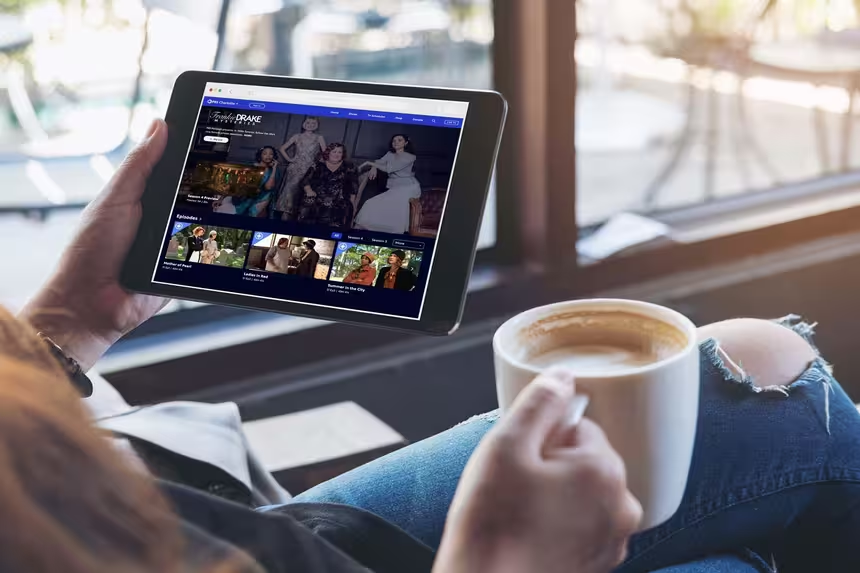
Big Dreams, Small Businesses, Young Moguls | Carolina Impact
Clip: Season 13 Episode 1305 | 6m 36sVideo has Closed Captions
At ACE Academy, kids spend weekends launching real businesses—and real future
At ACE Academy, entrepreneurship isn’t an afterthought it’s the foundation. Through the Young Moguls program, students as young as third grade spend their Saturdays turning ideas into businesses with seed money from the school. In just four years, they’ve launched ventures earning over $35,000, while gaining confidence, resilience, and life skills that last far beyond the classroom.
Problems playing video? | Closed Captioning Feedback
Problems playing video? | Closed Captioning Feedback
Carolina Impact is a local public television program presented by PBS Charlotte

Big Dreams, Small Businesses, Young Moguls | Carolina Impact
Clip: Season 13 Episode 1305 | 6m 36sVideo has Closed Captions
At ACE Academy, entrepreneurship isn’t an afterthought it’s the foundation. Through the Young Moguls program, students as young as third grade spend their Saturdays turning ideas into businesses with seed money from the school. In just four years, they’ve launched ventures earning over $35,000, while gaining confidence, resilience, and life skills that last far beyond the classroom.
Problems playing video? | Closed Captioning Feedback
How to Watch Carolina Impact
Carolina Impact is available to stream on pbs.org and the free PBS App, available on iPhone, Apple TV, Android TV, Android smartphones, Amazon Fire TV, Amazon Fire Tablet, Roku, Samsung Smart TV, and Vizio.

Introducing PBS Charlotte Passport
Now you can stream more of your favorite PBS shows including Masterpiece, NOVA, Nature, Great British Baking Show and many more — online and in the PBS Video app.Providing Support for PBS.org
Learn Moreabout PBS online sponsorshipIn classrooms across Charlotte, lessons usually focus on math, science and reading, but at ACE Academy students learn something you won't find in a textbook.
It's a lesson that could change the way they see their future.
Kids here are just raising their hands in class, they're raising ideas.
"Carolina Impact's" Chris Clark reveals how what they're building goes far beyond the classroom.
(screen whooshes) - [Chris] At first glance, ACE Academy looks like any other school covering the three R's and the basics every student needs.
But listen closer and you'll notice something different.
Mixed in with the math equations and spelling lists is the buzz of ideas, the energy of collaboration and the spark of ambition.
And here's the twist, it's Saturday morning.
While most kids are still sleeping in, these students are wide awake choosing to spend their weekend building companies because ACE Academy isn't a typical school, it's home to young moguls.
A program where entrepreneurship isn't an afterthought, it's the foundation.
- You have to learn how to read to be a successful entrepreneur, you have to be able to do math, you have to write.
And so, what we're helping the kids do is connect what they're learning during the day with entrepreneurship and they're seeing how those skills translate.
- [Chris] Founded in 2014 by Laila Minott and Shawn Smalls, ACE Academy began with a vision that stretched back years before the school's doors ever opened.
A passion project that put them in front of kids and afterschool programs, summer camps, non-profits, and even church groups.
- We had a company prior to starting Ace Academy Charter School where we taught kids entrepreneurship and we did that for 10 years.
But one of the challenges we had is we were teaching them an introductory course of entrepreneurship.
They weren't able to really create their own businesses.
Some of that was related to time, some of it was resources.
And so, the only way we could really teach kids to be true entrepreneurs was to have our own school.
- [Chris] That vision became the backbone of Ace Academy itself, where entrepreneurship isn't just an elective or an add-on, it's woven into the school day from the very beginning.
But for students who wanna push further, there's a chance to take it to another level.
- The kids learn entrepreneurship through kindergarten all the way to eighth grade every day.
But the young moguls, they come on extra Saturdays.
- [Chris] Kids as young as third grade are encouraged to think about what kind of business they want to run and why?
The answers are as diverse as the children's interests.
- My parents have a business, so I kind of wanted to follow along with the with them.
- My business have different items like drawstring bags, teddy bear key chains, bookmarks and T-shirts, that allow you to show how you feel without you having to say it.
- I knew that I would like to spend like a lot of money on stuff and begging my mom for money wasn't gonna work.
- [Chris] Once the why has been answered and the what takes form, the next chapter is the most demanding of all, the how.
It's in this stage that the ideas collide with the weight of reality.
- We want them to be able to answer a few questions.
So one, can you make this business?
Can do you have access to resources to make it?
So sometimes they'll pick things that you need a manufacturing plant and we'll discuss.
We don't have a manufacturing plant.
So what is tangible?
- [Chris] It's frustrating, but so is doing business in the real world.
Once the wrinkles are ironed out, students draft full business plans and pitch them to the class.
If the idea gets approved, it moves from concept to reality backed by seed money from the school.
- We might have a $500 cap.
Now we've gone over the $500, of course certain businesses require that, right?
And so, it just basically is a cap and then the kids have to work through that cap.
- [Chris] Some products find their way onto the shelves of the school store while others appear at pop-up shops across the community.
No matter where the sales happen, every enterprise collides with real world problems and that's where the learning begins.
- I didn't anticipate that so many people would like it from the gym.
So I kind of never had enough and I always, not always, but most time I sold out.
- Getting the materials and resources that I needed to make the business like with my thesis, we have to go to, like, different other businesses to see if they could print it how I needed it.
- 400 people outta the 500 says no.
Would you be discouraged?
I always ask them that and they're like, "Yeah, I'm discouraged, I'm upset."
Right, 400 people said no to you, but 100 people bought your product at $10 a pop.
How much money do you have?
And then the light bulb goes off.
- [Chris] On select weekends, guest entrepreneurs from chefs to podcasters step into the classroom sharing their journeys and opening windows to worlds these young moguls might never have imagined.
What they take away goes far beyond business plans or profit margins.
It reshapes how they think about money, responsibility, and choices they make every day.
- Not only do you get to earn money, but you also get to learn more about the financial part and learn more when it comes to the future as well.
You know, like earning and saving, and then splitting it up and being able to spend on the needs before the wants.
Like I may wanna get my hair done or something, but sometimes that has to come last and I have to put, you know, like the artwork first and get product first.
- [Chris] Beyond the dollars and cents, the program builds something even more valuable.
A voice.
Week by week students learn to stand taller, pitch bolder, carry themselves with the kind of confidence that spills into classrooms, living rooms and public settings far beyond the school walls.
- It taught me about like financially how to do my money and how to be more social again, not the most extroverted person.
- They'll have us talking to customers and speaking in front of an audience like our classmates and our peers.
And that's just been able to help me do it outside of the classroom and be able to present myself in network.
- [Chris] In just four years, young moguls has transformed classroom lessons into more than $35,000 in student run businesses and counting.
But the true measure of success isn't in the sales, it's in the skills.
Confidence, resilience and vision are taking root in these young entrepreneurs proving that the future of business leadership isn't waiting until tomorrow.
It's already here.
For "Carolina Impact," I'm Chris Clark.
The Accidental Baker | Carolina Impact
Video has Closed Captions
Clip: S13 Ep1305 | 7m 27s | What's in a name? How the name Accidental Baker is the perfect name for a new business. (7m 27s)
Gabe DeVoe Champions Literacy | Carolina Impact
Video has Closed Captions
Clip: S13 Ep1305 | 5m 25s | An international basketball player works to improve reading scores in Shelby. (5m 25s)
Table Tennis, Anyone? | Carolina Impact
Video has Closed Captions
Clip: S13 Ep1305 | 4m 18s | Fast passed fun with the Charlotte Table Tennis Club. (4m 18s)
October 7, 2025 Preview | Carolina Impact
Preview: S13 Ep1305 | 30s | Big Dreams, Young Moguls; Gabe DeVoe Champions Literacy; Table Tennis Anyone; & The Accidental Baker (30s)
Providing Support for PBS.org
Learn Moreabout PBS online sponsorship
- News and Public Affairs

Top journalists deliver compelling original analysis of the hour's headlines.

- News and Public Affairs

FRONTLINE is investigative journalism that questions, explains and changes our world.












Support for PBS provided by:
Carolina Impact is a local public television program presented by PBS Charlotte



